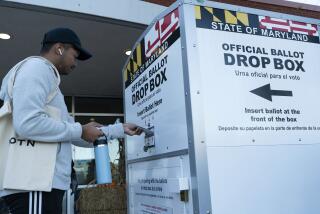COLUMN RIGHT : Turning ‘Civil Rights’ Upside Down : This bill augments rather than limits government power. It’s exactly backward.
- Share via
President Bush now has on his desk one more civil-rights bill. It passed both houses of Congress this summer by large margins, but probably not large enough to sustain a veto. Let’s hope that the President does veto the bill, one of the worst pieces of legislation of recent years. It has nothing to do with civil rights, properly understood.
Civil rights are limitations of government power. They itemize things that government is not authorized to do to any citizen. For example, the First Amendment says that Congress “shall make no law” prohibiting the freedom of the press. First Amendment rights are therefore something that all Americans have, not just journalists. The Fourth Amendment guarantees the right of people to be “secure in their persons, houses, papers and effects, against unreasonable searches and seizures.” Rights, then, apply to all citizens and they limit the power of government.
Recently, however, we have been propagandized, mostly by civil-rights lawyers who stand to gain, on behalf of a new, “expanded” interpretation of civil rights. But these “expanded rights” are misleadingly labeled. They actually augment the power of government rather than limit it, and apply to favored groups rather than all citizens. In the pending legislation, one of our most basic rights--the presumption of innocence--is jeopardized.
After the 1964 Civil Rights Act became law, employers could not legally discriminate against individuals on the basis of race, religion, sex or national origin. An enforcement provision noted that only if an employer “intentionally engaged in” an unlawful employment practice could courts step in and “order such affirmative action as may be appropriate.” The key word was “intentionally.” The bill’s chief architect, the late Sen. Hubert H. Humphrey, said: “The express requirement of intent is designed to make it wholly clear that inadvertent or accidental discrimination will not violate the title or result in the entry of court orders.”
Despite this, in a 1971 case, Griggs vs. Duke Power, the Supreme Court declared on its own authority, citing not one line or word of legislative language, that “Congress directed the thrust of the act to the consequences of employment practice, not simply the motivation.” This was judicial activism at its most extreme.
After Justice Anthony M. Kennedy joined the Supreme Court, a majority was willing to overturn some of the worst affirmative action rulings. In 1989, the court made it harder to claim that an employment practice was discriminatory just because it had a “disparate impact” on the labor pool. The burden of proof was shifted from companies to complainers.
Predictably, “civil-rights groups” didn’t take kindly to this. So they went to their friends in Congress, who cobbled together the bill that is now on the President’s desk. An “unlawful employment practice is established,” according to the new legislation, when a “complaining party demonstrates that an employment practice results in a disparate impact on the basis of race” and so on. The mere existence of employee groups disproportionate to the labor pool from which they were selected will give civil-rights lawyers the opportunity to file suits.
In other words, the presumption of innocence is discarded. If the bill is signed, the illegal intention to discriminate can confidently be imputed to innocent people, simply because they hired workers in non-approved proportions.
About the only way employers can guard against such a costly outcome is to hire in the approved racial and ethic proportions in the first place. In short, adopt quotas or risk trouble from award-seeking lawyers. The long-time civil-rights advocate Joseph Rauh conceded in July: “There may be some people who would use quotas as a basis of avoiding” such lawsuits. But, he added: “So what?”
So, it would be bad for the country if companies feel they have to hire people on the basis of ethnic criteria rather than merit. That outcome is almost the opposite of what the original Civil Rights Act was intended to achieve. Is it any surprise that race relations in this country appear to have deteriorated when we have accepted, with very little debate, such a degraded interpretation of the old and honorable idea of civil rights?
Bush has let it be known that he is “eager” to sign a civil-rights bill. Clearly he is fearful of being labeled “anti-civil rights.” But liberals should not be allowed to monopolize political vocabulary. Civil wrongs should not be permitted to masquerade as civil rights. If Bush can stand up militarily to Saddam Hussein, he can stand up rhetorically to the NAACP’s Benjamin Hooks.
More to Read
Get the L.A. Times Politics newsletter
Deeply reported insights into legislation, politics and policy from Sacramento, Washington and beyond. In your inbox twice per week.
You may occasionally receive promotional content from the Los Angeles Times.










